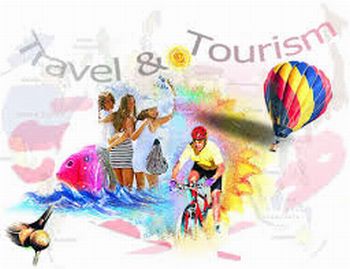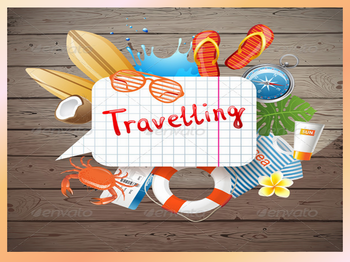21/07/2014
Eliana Dias e Lazuíta Goretti de Oliveira
| Modalidade / Nível de Ensino | Componente Curricular | Tema |
|---|---|---|
| Ensino Médio | Língua Estrangeira | Produção escrita |
| Ensino Médio | Língua Estrangeira | Compreensão oral |
| Ensino Médio | Língua Estrangeira | Competência pluricultural: língua como meio de acesso às manifestações culturais |
| Ensino Médio | Língua Estrangeira | Competência comunicativa: componentes linguísticos, sociolinguísticos e pragmáticos |
| Ensino Médio | Língua Estrangeira | Produção oral |
| Ensino Médio | Língua Estrangeira | Compreensão leitora |
O que o aluno poderá aprender com esta aula
- Aprender e usar expressões relacionadas a viagens e turismo.
Duração das atividades
Conhecimentos prévios trabalhados pelo professor com o aluno
É necessário que o aluno tenha conhecimento das estruturas básicas da língua inglesa, como verbos, pronomes, advérbios e adjetivos.
Estratégias e recursos da aula
- Recursos multimídia;
- vídeos;
- slides;
- atividades de compreensão oral;
- atividades de compreensão escrita;
- diálogos;
- imagens veiculadas na internet;
- atividades xerocopiadas;
- role-play.
TRAVELING AND TOURISM

Imagem disponível em: https://www.google.com.br/search?hl=pt-PT&site=imghp&tbm=isch&source=hp&biw=1024&bih=643&q=traveling+and+tourism&oq=TRAVELING+AND+TOURISM&gs_l=img.1.0.0i19.662.5113.0.6661.
com.sg%252Ftravel%2526tourism01.html%3B455%3B349 (Acesso em: 23.06.2014)
MÓDULO 1

Travel vocabulary
v departure (n)
1. The act of leaving; a starting out, as on a trip or a new course of action.
Ex1: The evening before their scheduled departure for Glasgow, Marguerite and Nicholas returned to the closed doll shop so she could put together a small box of miniature furniture and other accoutrements for the baby house they had already packed to take to Claudette's daughter, Rebecca.
Ex2: Your Eurostar departure will normally be between 8 a.m. and 9 a.m., although on some holidays an earlier start of around 6 a.m. is necessary.
v departures (n)
1. the place at an airport where people leave when they board (get on) a plane
Ex1: Backups at the checkpoints are forcing Air Canada to postpone some departures, said Peter Fitzpatrick, an airline spokesman.
v arrival (n)
1. the act of arriving; when someone or something arrives somewhere
Ex1: Traffic problems account for one third of late arrivals.
v arrivals (n)
2. the place at an airport where people arrive when they get off a plane
Ex1: At Ronald Reagan National Airport in Virginia near Washington, arrivals and departures were briefly halted, alarms went off and objects tumbled from shelves.
v passport (n)
1. An official government document that certifies one's identity and citizenship and permits a citizen to travel abroad
Ex1: For non-British passport holders and for British passports endorsed in any way, requirements should be checked with the nearest relevant embassy.
v boarding (n)
1. theact of a person who boards a ship, train, airplane, etc.
2. to board= to get on a plane, ship, boat, etc.
Ex1: Boardingis now taking place at Gate 38.
Ex2: In order to board the plane, you are required to present your boarding pass at theboarding gate.
boarding gate= a gate used for boarding (usually when traveling by plane)
Ex1: Sawyer showed her his FBI credentials and quickly explained his situation. The supervisor picked up a phone and alerted both the boardinggate and security, who would, in turn, inform the flight crew.
boarding pass(boarding card) = a card that you show before you get on a plane or boat; a pass that authorizes a passenger to board an aircraft or boat.
Ex1: You must have a boarding pass and photo ID to go through security and on to the gate concourses.
v to refund (vb)
1. to give someone their money back, especially because they are not satisfied with the goods or services they have paid for
Ex1: I took the radio back, and theyrefundedmymoney.
v carriage (n)
1. the act of carrying; transportation
Ex1: Passengers without a valid passport will be refused carriage on international flights.
v to advise (vb)
1. to tell someone what you think they should do, especially when you know more than they do about something
2. to advise someone to do something
Ex1: You arestrongly advisedto take out medical insurance when visiting China.
v baggage (n)
1. the cases, bags, boxes, etc. carried by someone who is travelling[= luggage]
Ex1: Check your baggage in at the desk.
baggage room(left luggage office) = a place, usually in a station, where you can leave your bags and collect them later
baggage reclaim(baggage claim) = the place at an airport where you collect your cases and bags after a flight
v airport (n)
1. a place where planes take off and land, with buildings for passengers to wait in
Ex1: The plane landed at Heathrow Airport at 13:45.
v (to) travel (vb+n+adj) = a very general term used to talk about going from one place to another
Ex1: Jack travels a lot in his job. He is a salesman. (vb)
Ex2: Travel nowadays is faster and cheaper than a few years ago. (n)
Ex3: There is a travel agency opposite to my house. (adj)
v trip (n) = a term used to talk about a short journey from one place to another for a purpose (business, pleasure, etc.) ; usually the process or the reason of going in more important than the destination
Ex1: For our wedding anniversary we decided to go on a trip to Las Vegas.
Ex2: My wife is often abroad on business trips.
Ex3: During our holiday to Bahamas we took a boat trip to some beautiful small islands.
vj ourney (n) = a term used to define the distance covered in traveling from one place to another; it can be a long or a short or a regular distance
Ex1: Our journey was long and tiring; it took us 7 hours to get there.
Ex2: Did you have a pleasant journey? – Yes, actually it seemed shorter this time.
Ex3: How long is your daily journey to work? – About 45 minutes.
v (to) tour (n+vb) = (n) a tour is a journey during which several places are visited, especially on a holiday; (vb) to tour means to visit several parts of a country or area, to go round or be shown round a place
Ex1: We went on a tour of France. (n)
Ex2: We toured the north of Italy. (vb)
v voyage (n) = a long journey by sea or in space
Ex1: In the 19th century long sea voyages were common.
Ex2: Rich people can take a spacecraft and go on a voyage through space.
v outing (n) = a short pleasure trip usually lasting no more than a day; a short trip that a group of people take for pleasure
Ex1: They hadgone on an outingto the pool for Jack's birthday.
v (to) cruise (n+vb) = (vb) to sail along slowly, especially for pleasure; (n) a holiday on a large ship, a journey by boat for pleasure
Ex1: A Mediterranean cruise would be the best wedding gift for your sister. (n)
Ex2: We were cruising in the Caribbean all winter. (vb)
v expedition (n) = a carefully organized journey undertaken by a group of people with a definite objective (accomplishing a specific purpose)
Ex1: We believe that an expedition to the North Pole would be dangerous without the proper equipment.
v excursion (n) = a short journey arranged so that a group of people can visit a place, especially while they are on holiday
Ex1: Included in the tour is an excursion to the Grand Canyon.
Ex2: We went on an excursion to the Pyramids.
v guided tour (n) = if someone takes you on a guided tour, they show you around a place of interest and tell you all about it; you can also take a guided tour or a city or even a country
Ex1: You will be taken on a guided tour of the palace.
Ex2: We enjoyed most the guided tour of the Coliseum.
Adaptado do site: http://busyteacher.org/8551-travel-vocabulary.html (Acesso em: 24.06.2014)

What you do at the airportWhen you arrive at the airport, you go into the terminal building. You check in for your flight at the check-in desk. You show your passport at passport control and then go through security, where they check that you are not carrying any weapons. If you have time you can wait for your flight in the departure lounge. When your flight is called, you go through the departure gate in order to get onto (board) the plane. The plane then takes off from the runway. After your plane has landed, you go to the baggage reclaim to collect your bags, then go through customs and immigration, where they check your passport and your bags. You then go out into the arrivals area. Fonte: http://busyteacher.org/8551-travel-vocabulary.html (acesso em 24.06.2014) |
MÓDULO 2
1. What is the man's destination?
A. Salt Lake City, USA
B. New York City, USA
C. Helsinki, Finland
D. Stockholm, Sweden
2. When is the man's departure date?
A. the twenty-first
B. the twenty-second
C. the twenty-third
D. the twenty-fourth
3. What is the flight number for the second half of his journey?
A. 555
B. 90
C. 1070
D. 830
4. How long is the man's layover between flights?
A. less than an hour
B. less than two hours
C. less than three hours
D. more than three hours
5. What request did the man make regarding his flight?
A. He asked for a specially-prepared dinner.
B. He wanted an aisle seat.
C. He requested a bassinet for his baby.
D. He asked for a seat near the front of the plane.
QUIZ SCRIPT
Caller: Yes, I'd like to make a flight reservation for the twenty-third of this month.
Travel Agent: Okay. What is yourdestination?
Caller: Well. I'm flying to Helsinki, Finland.
Travel Agent: Okay. Let me check what flights are available?. [Okay] And when will you be returning?
Caller: Uh, well, I'd like to catch a return flight on the twenty-ninth. Oh, and I'd like the cheapest flight available.
Travel Agent: Okay. Let me see. Um, hmm . . .
Caller: Yeah?
Travel Agent: Well, the price for the flight is almost double the price you would pay if you leave the day before.
Caller: Whoo. Let's go with the cheaper flight. By the way, how much is it?
Travel Agent: It's only $980.
Caller: Alright. Well, let's go with that.
Travel Agent: Okay. That's flight 1070 from Salt Lake City to New York, Kennedy Airport, transferring to flight 90 from Kennedy to Helsinki.
Caller: And what are the departure and arrival times for each of those flights?
Travel Agent: It leaves Salt Lake City at 10:00 AM, arriving in New York at 4:35 PM, then transferring to flight 90 at 5:55 PM, and arriving in Helsinki at 8:30 AM the next day.
Caller: Alright. And, uh, I'd like to request a vegetarian meal.
Travel Agent: Sure, no problem. And could I have you name please?
Cards:
| TRAVEL AGENT |
TRAVEL AGENT |
TRAVEL AGENT |
| TRAVEL AGENT |
TRAVEL AGENT |
TRAVEL AGENT |
| TRAVEL AGENT |
You are outgoing people. You like adventure and wild life. Your friend loves animals but prefers having a ‘normal’ trip. You want to have a vacation where both of you can have a good time.
Budget: not more than Rp. 2,000,000,- for two Time for vacation:2 days |
You are the spoiled children of a famous billionaire. You are pretty much party-goers who love fancy stuff. But, you also want to have a peaceful vacation, where you can be away from paparazzi.
Budget: unlimited Time for vacation: 3 days |
| You are college students who want to try to escape from reality. You love to hang out with people, but not animals. Places with good food are preferable.
Budget: less then Rp. 500,000,- for two Time for vacation: 2 days
|
You and your friend are so into photography. You want to visit scenic places so you can take pictures. You are also interested in history and culture.
Budget: around Rp. 1,500,000,- for two Time for vacation: 2 days |
You have just retired from your 30 years of dedication in a well-known company in Jakarta. You take your child to accompany you doing crazy things you haven’t done before in your life.
Budget: Rp. 20,000,000 Time for vacation: 10 days |
| You are broken hearted. You want to forget your ex-fiancée, so you take your best friend on a trip. You’d love to try new things but you are phobia to height, animals, small place, and crowds. You are a shopaholic.
Budget: Rp. 5,000,000,- for two Time for vacation: 3 days
|
You and your partner are nature lovers. You don’t want to spend your coming vacation in concrete jungle. You want to breathe fresh air and have a life-changing experience during your vacation. You hate staying at a hotel.
Budget: Rp. 1,000,000 for two Time for vacation: 5 days
|
You and your friend are not much of a traveler. But you have read a book about backpacking and love to try visiting other towns. You’ve never had a chance to travel before. So, now you want to make your trip as efficient as possible.
Budget: Rp. 1,000,000 for two Time for vacation: a week. |
Fonte: http://busyteacher.org/2799-travel-guide.html (Acesso em: 25.06.2014)
Recursos Complementares
Para vídeos sobre o tema da aula, acesse:
http://pt.englishcentral.com/search?search=traveling (Acesso em: 24.06.2014);
Para atividades de compreensão auditiva:
http://esl-lab.com/trainnew/index.htm (Acesso em: 25.06.2014)
http://esl-lab.com/trip1/trip1.htm (Acesso em: 25.06.2014)
http://esl-lab.com/plane1/pln1.htm#post (Acesso em: 25.06.2014)
http://www.englishwithjo.com/english-conversation-travel/ (Acesso em 25.06.2014)
Avaliação
Todos os momentos da aula deverão ser avaliadas pelo professor, que deverá ficar atento à motivação, participação e ao envolvimento dos alunos com o tema da aula e com as atividades propostas.
Para uma avaliação formal, os alunos, em duplas, deverão escolher um país ou uma cidade e descrever suas principais características como: culinária, roupas, danças, clima, língua, lugares turísticos etc. Em seguida, deverão elaborar um diálogo entre um agente de viagem e um turista interessado em viajar para esse lugar pesquisado pelo agente. O diálogo deverá conter detalhes do lugar escolhido, como as características pesquisadas pelo agente, horários de voos, tipos, disponibilidade e preço das acomodações. Os diálogos deverão ser encenados pelos alunos. É necessário, ainda, uma produção escrita que será entregue ao professor, com imagens ou gravuras do local apresentado.
Essa produção escrita poderá ser compartilhada em uma plataforma digital, criada pelo grupo. Para a avaliação, o professor deverá observar o capricho com as imagens, a pronúncia das palavras, a encenação, bem como a acuidade do conteúdo apresentado na aula.
Sem estrelas 0 classificações
- Cinco estrelas 0/0 - 0%
- Quatro estrelas 0/0 - 0%
- Três estrelas 0/0 - 0%
- Duas estrelas 0/0 - 0%
- Uma estrela 0/0 - 0%
Denuncie opiniões ou materiais indevidos!
- Sugestão de aula
- Aulas
- Coleções de aulas
- Criar aula
- Criar individual
- Criar em equipe
- Gerenciar equipes
- Minhas aulas
- Orientações
- Criando equipes
- Dicas para a produção de aulas
- Reflexões pedagógicas
- Utilizando a ferramenta
- Artigo: portal educacional
- Estatísticas de uso do Portal
- Estatísticas de aulas
- Estatísticas de recursos
- Estatísticas de visitas
- Recursos utilizados em aulas
- Reflexões pedagógicas
- Informações de cursos
- Cursos
- e-Proinfo
- Materiais de cursos
- Materiais de estudo
- Artigos e publicações
- Assuntos relevantes
- Avaliações
- Ciência do cotidiano
- Destaques internacionais
- Dicas práticas
- Educação profissional e tecnológica
- Entrevistas
- Estratégias pedagógicas
- Inovações tecnológicas
- Materiais de cursos
- Materiais de evento
- Orientações e diretrizes
- Parâmetros e referencias
- Programas em vídeos
- Tutoriais
- TVescola
- Ferramentas do portal
- Fórum
- Portal do Youtube
- Compartilhando apresentação
- Ferramentas pela internet
- Blog
- Compartilhe vídeos
- Comunicação on-line
- Crie e compartilhe apresentações
- Edite e compartilhe fotos
- Escrita colaborativa
- Junte-se a uma comunicade
- Lista de discussão
- Organize e compartilhe favoritos
- Podcast
- Rádio/TVs Universitárias e outros
- Redes Sociais
- Robô Ed
PLATAFORMA FREIRE
- Bibliotecas
- Capacitação Proinfo Integrado
- Cultura
- Dicionários, tradutores e enciclopédias
- Educação inclusiva
- Geoprocessamentos
- Inclusão digital
- Infográficos
- Jogos educativos
- Jornais
- Museus
- Observatórios e planetários
- Organizações governamentais
- Plataformas educacionais
- Portais educacionais e outros
- Portal MEC
- Prêmio professores do Brasil
- Produções de professores
- Projetos de escolas
- Projetos inovadores
- Projetos sociais e educacionais
- Rádio escola
- Recursos digitais
- Revistas
- Sites de busca
- Sites temáticos do portal e TVescola
- Softwares de edição e outros
- Softwares educacionais
- Um computador por aluno

- Ryan Oksenhorn
- Ryan Snow
- Sergio Caldara
- Shane Miler
- Shane Herzog
- Sotirios Papavasilopoulos
- Stephen JB Thomas
- Tarah
- Valera Nazarov
- ZbigniewMa K Flakus


